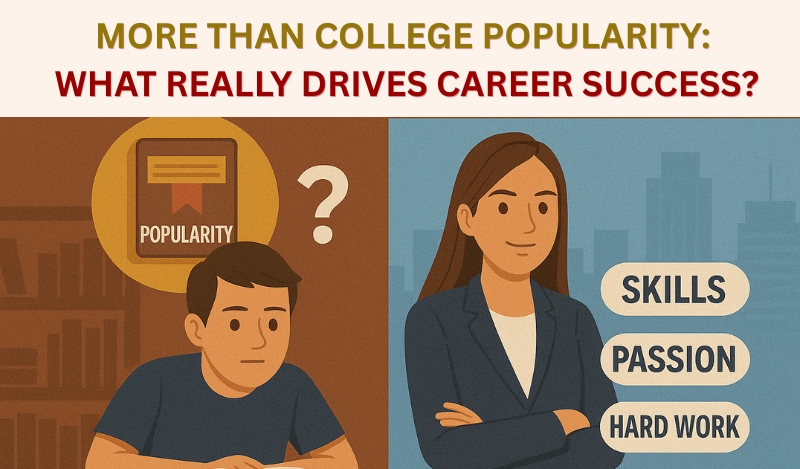Every year, many students and parents aim to get into colleges that are well-known or have a big name. People often think that a famous college means better education and a guaranteed successful career. It’s easy to believe that going to a popular college will lead to high-paying jobs and a smooth career path.
But here’s something every student should know: being in a popular college can help you get noticed at first, but it doesn’t promise long-term success. In today’s world, what really matters is learning practical skills, gaining real experience, and staying ready for challenges.
In this blog, we’ll talk about why college popularity isn’t everything and what you should actually focus on to build a strong and successful career.
The Hype Around College Popularity
For most students, a college with a big name automatically seems like the best choice. Parents often believe that a popular institution equals security, success, and better job offers. But have you ever paused to ask- what makes a college “popular” in the first place?
Most college popularity is driven by:
- Research publications and academic credentials
- Large campuses and advanced infrastructure
- International tie-ups and historical prestige
While these are valid achievements, they often don’t reflect the student experience—things like internship support, mentorship, placement outcomes, or skill-building focus. A college might have global fame, but if it lacks practical, job-oriented education, that popularity becomes just a label.
Does Popularity Guarantee Career Success?
There are countless professionals who graduated from lesser-known colleges and yet reached top positions in their industries. How? Because they focused on building skills, gaining experience, and working hard—rather than depending solely on their college’s name.
Today, employers want to see what you can do, not just where you studied. A student with hands-on project experience, industry-relevant certifications, and a strong portfolio will often outperform someone from a prestigious college with only theoretical knowledge.
In simple words: college popularity might open the door, but it’s your skills that keep it open.
What Really Drives Career Success
A college’s fame can give you a head start, but lasting success depends on what you do while you’re there. When selecting a college, ask yourself what it will give you beyond reputation.
Here’s what you should prioritize:
1. Practical Training & Industry Exposure
Classroom knowledge is essential, but it’s not enough. Employers want graduates who can apply what they’ve learned.
Ask questions like:
- Does the college offer internships or live projects?
- Are there opportunities for industry interaction and real-world learning?
- Can you access labs, software tools, or business simulations?
The earlier you gain exposure to your field, the more confident and capable you become.
2. Placement Support & Alumni Success
Don’t just look at a college’s name—look at where its students are going.
- What percentage of students get placed each year?
- Which companies recruit regularly?
- What types of job roles and salary packages are offered?
- Does the college have a strong recruiter network?
A broad and consistent recruiter base increases your chances of landing a quality job. Also, explore alumni achievements—graduates working in top companies or leading startups show that the college creates real career results, not just theoretical learning.
3. Skill Development Opportunities
In 2025 and beyond, employers expect students to come prepared with job-ready skills. A forward-thinking college should:
- Offer certifications in software and tools like Tally, SAP, Excel, or Power BI for finance students; or AutoCAD, Python, and AI tools for tech fields.
- Encourage participation in competitions, webinars, and online programs.
- Push you to grow beyond textbooks—into areas that matter in the modern job market.
Remember: the more industry-relevant your skills, the more career-ready you become.
4. Faculty Quality & Mentorship
Good colleges don’t just teach—they guide.
Look for:
- Faculty with real-world industry experience, not just academic backgrounds.
- Mentors who help you plan your career, choose the right internships, or build a project portfolio.
- Faculty who are accessible, invested, and engaged.
A great mentor can help you grow faster than any big-name degree ever could.
5. Student Support & Learning Environment
A positive learning atmosphere can shape your mindset for success. Choose colleges that invest in:
- Career counselling and interview prep
- Soft skill training through clubs, events, and group activities
- A culture that encourages creativity, leadership, and curiosity
Your ability to communicate, collaborate, and lead is often as valuable as your technical knowledge.
The Role of Self-Effort
Even the most prestigious college can’t guarantee success if you’re not actively working toward it. Many students from popular institutions fail to stand out because they depend too much on their college name.
Meanwhile, many students from mid-level colleges succeed because they:
- Take internships seriously
- Learn new tools on their own
- Build strong professional networks
- Keep upskilling continuously
Your growth depends on your choices, effort, and commitment—not the logo on your college ID card.
Final Thoughts
College popularity isn’t meaningless it often reflects strong academics and resources. But it’s not the whole story. In the end, what drives your career success is how you use the opportunities, build your skills, and stay proactive.
Your future won’t be decided by whether your college was trending or talked about. It will be shaped by what you learn, how you apply it, and how determined you are to grow.
So yes, aim for a good college but don’t chase popularity alone. Build your career around value, not just buzz. Your degree might get you the interview, but your skills will land you the job.










